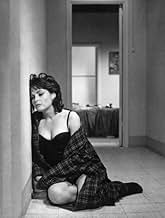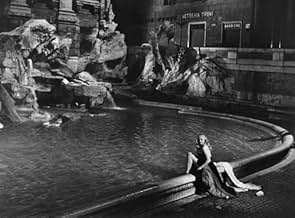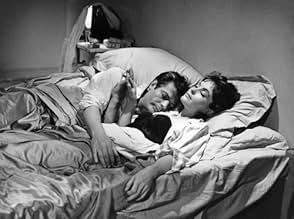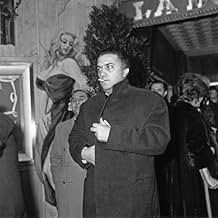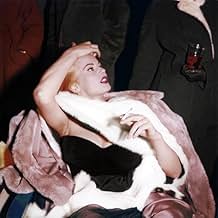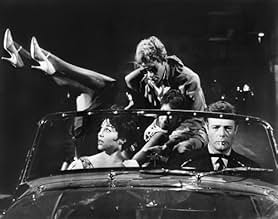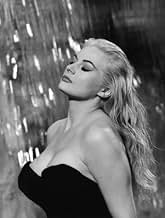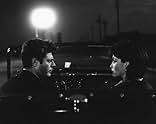Uma série de histórias que se seguem por uma semana, a vida de um jornalista que mora em Roma.Uma série de histórias que se seguem por uma semana, a vida de um jornalista que mora em Roma.Uma série de histórias que se seguem por uma semana, a vida de um jornalista que mora em Roma.
- Direção
- Roteiristas
- Artistas
- Ganhou 1 Oscar
- 11 vitórias e 12 indicações no total
Anouk Aimée
- Maddalena
- (as Anouk Aimee)
Magali Noël
- Fanny
- (as Magali Noel)
Resumo
Reviewers say 'La Dolce Vita' delves into themes of fame, decadence, and the superficiality of celebrity culture, using these characters to underscore the contrasts and contradictions within high society. The portrayal of it's characters enhances the film's satirical and critical perspective on the lifestyles and attitudes of the era, offering a nuanced commentary on the nature of fame and its impact on individuals and society.
Avaliações em destaque
I first saw this movie probably over 25 years ago when I was quite a bit younger. At that point I enjoyed it for its party scenes, sense of joy and life and vitality and....Marcello Mastroianni. Now that I'm older myself and have just recently seen the movie again, I find that I have a much deeper understanding of it. Maybe it takes some age to find some meaning. In a nutshell, Marcello is at a crossroads in his life, he's unable to settle down or move foreward into any direction - he's a diletante with aspirations but no real goals. He's wrapped up in himself and in projecting rather dreamy ideals onto other people. But as he keeps projecting on to others he comes to find in each situation that he doesn't really know the person and they are a mystery and probably a disappointment to him. certainly steiner is the biggest disappointment and disillusions him to a degree that he is apparently lost to a life of corruption and decadence as a result. but it's not that these people are difficult to understand to someone other than marcello - i think we can see that anita ekberg's character really is just a big good-natured blond and not the mysterious goddess marcello makes her out to be; his father is again - the typical traveling salesman and perhaps not the paternal figure that marcello would like him to be. his amour maddelena lives up to her name even as marcello starts believing himself in love with her - he's literally seduced by nothing more than an image he creates in his own mind. his friend steiner seems to have it all to marcello and to be the renaissance man that he would like to be - but, of course, he is dissatisfied and disturbed and we see what the end is. the only one whom marcello forms a somewhat realistic connection with is his girlfriend whom he treats badly and neglects despite her obvious love for him. he refuses to actually work on the one relationship that he could actually succeed at - he would rather dream about possibilities than actualize something.
marcello cannot communicate with others because he cannot see them as the people they really are - he just sees them as projections of his own needs, aspirations, desires and goals. when he finds out what they're really like, he either turns away or falls apart. this is an outstanding movie - 10 out of 10 and beautifully photographed. if you don't get it now, try again in 10 years - it will wait for you to catch up.
marcello cannot communicate with others because he cannot see them as the people they really are - he just sees them as projections of his own needs, aspirations, desires and goals. when he finds out what they're really like, he either turns away or falls apart. this is an outstanding movie - 10 out of 10 and beautifully photographed. if you don't get it now, try again in 10 years - it will wait for you to catch up.
(first of all, sorry my poor english) Who, in this entire world, drunk as a horse in the middle of the night, never discovered the meaning of life, that it can be so easy and joyfull that hurts. This happens with a certain frequency. The big problem is, after all that, to face all the thoughts and conclusions in a sober monday morning, when everything is just real, concious and above all that sincere. This is the the big question and problem of Marcello Rubini, a reporter of a gossip magazines who has to deal with the fact that he tastes the same poison he spreads by leaving in a group of people which he sucks his living.
In a moment he is directing his papparazzi and, in the next, he is running away from them. He flows between all kinds of social circles and the only impression he gives is that it doesnt matter what kind of craziness you are getting into everything is a big cliché. From the mainstream world of a gorgeous actress who feels able to express opinions about everything (and we buy it), passing throught the religious world of the faith, and also an intellectual circle that gives a fake impression of freedom, everything turns out to be an escape. That blonde girl appears as a stroke of pureness and sincereness, something we should really look for, but we just dont. In the case of Marcello's life, writing is the solutions he always substitute for vain experiences. Something he likes and that he needs a young girl to tell him that. That litlle cute girl is a person Marcello would like to be, someone who faces the soberty of a monday morning with hopeness and happiness.
A masterpiece.
In a moment he is directing his papparazzi and, in the next, he is running away from them. He flows between all kinds of social circles and the only impression he gives is that it doesnt matter what kind of craziness you are getting into everything is a big cliché. From the mainstream world of a gorgeous actress who feels able to express opinions about everything (and we buy it), passing throught the religious world of the faith, and also an intellectual circle that gives a fake impression of freedom, everything turns out to be an escape. That blonde girl appears as a stroke of pureness and sincereness, something we should really look for, but we just dont. In the case of Marcello's life, writing is the solutions he always substitute for vain experiences. Something he likes and that he needs a young girl to tell him that. That litlle cute girl is a person Marcello would like to be, someone who faces the soberty of a monday morning with hopeness and happiness.
A masterpiece.
Long, episodic film by Federico Fellini about the conceits and facades of life: fame, intellect, sex, friendship, despair, innocence, etc.
Marcello Mastroianni is perfect as the shallow tabloid reporter who joyfully follows around Rome a blonde movie star from Sweden (Anita Ekberg) as she prowls around the city's bars and bistros. He is also having an affair with a woman (Anouk Aimee) while his girl friend (Yvonne Furnaux) seems to be going nuts.
But as Marcello moves through the city following the movie star, the miracle of the virgin, a few parties, etc. we see that his life is very empty because the things he reports on are meaningless drivel. We see that fame and fortune and the trappings of success are meaningless.
Marcello starts to realize that the movie star is a vapid airhead, the miracles are a sham, and his friend's (who seemed quite happily married) ghastly murder and suicide show the futility of life itself.
The Fellini themes are common to many of his films, but what makes La Dolce Vita so memorable are the cynical tone, the Nina Rota music, and the string of terrific visual images.
The opening scene is of a helicopter hauling a gilded plaster statue through the air across Rome. The flying saint is a bizarre image but serves to set up the movies which is all about images and events that are never what they seem to be.
Notable are the scenes of statuesque Ekberg in that terrific strapless black dress with the voluminous skirts as she swishes around dancing and eventually wading through a city fountain. The party scenes are also notable. The first because of the intolerable intellectuals who sits around and talk and talk but never do anything. The last party has the indelible image of Mastroianni "riding" a drunken blonde woman as though she were a horse. The final image of the giant dead fish is quite unsettling as it symbolizes their bloated lives.
Fellini is brilliant in filling scenes with odd people as extras, usually hideously dressed or wearing ugly glasses. The "gallery" of people who inhabit the city is one of grotesques, vapid fashion slaves, the rich, hangers on, etc.
A long film, but highly recommended and very memorable.
Marcello Mastroianni is perfect as the shallow tabloid reporter who joyfully follows around Rome a blonde movie star from Sweden (Anita Ekberg) as she prowls around the city's bars and bistros. He is also having an affair with a woman (Anouk Aimee) while his girl friend (Yvonne Furnaux) seems to be going nuts.
But as Marcello moves through the city following the movie star, the miracle of the virgin, a few parties, etc. we see that his life is very empty because the things he reports on are meaningless drivel. We see that fame and fortune and the trappings of success are meaningless.
Marcello starts to realize that the movie star is a vapid airhead, the miracles are a sham, and his friend's (who seemed quite happily married) ghastly murder and suicide show the futility of life itself.
The Fellini themes are common to many of his films, but what makes La Dolce Vita so memorable are the cynical tone, the Nina Rota music, and the string of terrific visual images.
The opening scene is of a helicopter hauling a gilded plaster statue through the air across Rome. The flying saint is a bizarre image but serves to set up the movies which is all about images and events that are never what they seem to be.
Notable are the scenes of statuesque Ekberg in that terrific strapless black dress with the voluminous skirts as she swishes around dancing and eventually wading through a city fountain. The party scenes are also notable. The first because of the intolerable intellectuals who sits around and talk and talk but never do anything. The last party has the indelible image of Mastroianni "riding" a drunken blonde woman as though she were a horse. The final image of the giant dead fish is quite unsettling as it symbolizes their bloated lives.
Fellini is brilliant in filling scenes with odd people as extras, usually hideously dressed or wearing ugly glasses. The "gallery" of people who inhabit the city is one of grotesques, vapid fashion slaves, the rich, hangers on, etc.
A long film, but highly recommended and very memorable.
Mostly because of the terrific high contrast, B&W visuals, and the evocative music, this is the only Fellini film I have seen that I have somewhat enjoyed. I recommend it, but not without reservations. It's a complex film with many textured layers of meaning. And, in typical Fellini fashion, it rambles and it meanders.
Deviating from standard three-Act structure, Fellini's story consists of roughly eight episodes, all starting at night and ending at dawn, more or less. Each has its own crisis. And the only thing that unites these episodes into a coherent whole is the story's protagonist, Marcello (Marcello Mastroianni). In his job as a journalist and overall observer of human nature, Marcello encounters people in high society who seem outwardly happy and self-fulfilled. On closer examination, however, these people are empty, hollow, alienated, emotionally adrift and vacant.
A good example is the starlet Sylvia (Anita Ekberg), a glamorous figure, but she's all image and no substance. "La dolce vita" is the first film that uses the concept of "paparazzi", which implies the importance of "image", separate from substance.
Throughout the various episodes Marcello sees these "images" of happiness, of contentment, but the images are deceptive, elusive, unreliable. In one episode, two "miracle" children "see" the Madonna. "The Madonna is over there", shouts one child. The crowd chases after her. But the other child who "sees" the Madonna runs in the opposite direction. Happiness, self-fulfillment, religious visions ... they're all a will-o'-the-wisp. And so, the film conveys a sense of pessimism and cynicism.
The film thus has deep thematic value. It caused a scandal when it was released, and was banned by the Catholic Church, apparently for appearing to be anti-religious.
Yet for all its deep meaning, "La dolce vita" can be a trial to sit through. Somewhere in the second half I began to lose interest. I don't have a problem with Fellini's deviation from standard plot structure. I do have a problem with a director who doesn't know when to quit. This film goes on for almost three hours. A good edit, to delete all the fat, would have tightened up the story and rendered it more potent. As is, it's too strung out, too stretched, too meandering.
If the viewer can persevere, there's enormous cinematic art in this film. And helped along by Nino Rota's music, the film is wonderfully evocative, at times stylishly melancholy.
Deviating from standard three-Act structure, Fellini's story consists of roughly eight episodes, all starting at night and ending at dawn, more or less. Each has its own crisis. And the only thing that unites these episodes into a coherent whole is the story's protagonist, Marcello (Marcello Mastroianni). In his job as a journalist and overall observer of human nature, Marcello encounters people in high society who seem outwardly happy and self-fulfilled. On closer examination, however, these people are empty, hollow, alienated, emotionally adrift and vacant.
A good example is the starlet Sylvia (Anita Ekberg), a glamorous figure, but she's all image and no substance. "La dolce vita" is the first film that uses the concept of "paparazzi", which implies the importance of "image", separate from substance.
Throughout the various episodes Marcello sees these "images" of happiness, of contentment, but the images are deceptive, elusive, unreliable. In one episode, two "miracle" children "see" the Madonna. "The Madonna is over there", shouts one child. The crowd chases after her. But the other child who "sees" the Madonna runs in the opposite direction. Happiness, self-fulfillment, religious visions ... they're all a will-o'-the-wisp. And so, the film conveys a sense of pessimism and cynicism.
The film thus has deep thematic value. It caused a scandal when it was released, and was banned by the Catholic Church, apparently for appearing to be anti-religious.
Yet for all its deep meaning, "La dolce vita" can be a trial to sit through. Somewhere in the second half I began to lose interest. I don't have a problem with Fellini's deviation from standard plot structure. I do have a problem with a director who doesn't know when to quit. This film goes on for almost three hours. A good edit, to delete all the fat, would have tightened up the story and rendered it more potent. As is, it's too strung out, too stretched, too meandering.
If the viewer can persevere, there's enormous cinematic art in this film. And helped along by Nino Rota's music, the film is wonderfully evocative, at times stylishly melancholy.
LA DOLCE VITA presents a series of incidents in the life of Roman tabloid reporter Marcello Rubini (Marcello Mastroianni)--and although each incident is very different in content they create a portrait of an intelligent but superficial man who is gradually consumed by "the sweet life" of wealth, celebrity, and self-indulgence he reports on and which he has come to crave.
Although the film seems to be making a negative statement about self-indulgence that leads to self-loathing, Fellini also gives the viewer plenty of room to act as interpreter, and he cleverly plays one theme against its antithesis throughout the film. (The suffocation of monogamy vs. the meaninglessness of promiscuity and sincere religious belief vs. manipulative hypocrisy are but two of the most obvious juxtapositions.) But Fellini's most remarkable effect here is his ability to keep us interested in the largely unsympathetic characters LA DOLCE VITA presents: a few are naive to the point of stupidity; most are vapid; the majority (including the leads) are unspeakably shallow--and yet they still hold our interest over the course of this three hour film.
The cast is superior, with Marcello Mastroianni's personal charm particularly powerful. As usual with Fellini, there is a lot to look at on the screen: although he hasn't dropped into the wild surrealism for which he was sometimes known, there are quite a few surrealistic flourishes and visual ironies aplenty--the latter most often supplied by the hordes of photographers that scuttle after the leading characters much like cockroaches in search of crumbs. For many years available to the home market in pan-and-scan only, the film is now in a letterbox release that makes it all the more effective. Strongly recommended.
Gary F. Taylor, aka GFT, Amazon Reviewer
Although the film seems to be making a negative statement about self-indulgence that leads to self-loathing, Fellini also gives the viewer plenty of room to act as interpreter, and he cleverly plays one theme against its antithesis throughout the film. (The suffocation of monogamy vs. the meaninglessness of promiscuity and sincere religious belief vs. manipulative hypocrisy are but two of the most obvious juxtapositions.) But Fellini's most remarkable effect here is his ability to keep us interested in the largely unsympathetic characters LA DOLCE VITA presents: a few are naive to the point of stupidity; most are vapid; the majority (including the leads) are unspeakably shallow--and yet they still hold our interest over the course of this three hour film.
The cast is superior, with Marcello Mastroianni's personal charm particularly powerful. As usual with Fellini, there is a lot to look at on the screen: although he hasn't dropped into the wild surrealism for which he was sometimes known, there are quite a few surrealistic flourishes and visual ironies aplenty--the latter most often supplied by the hordes of photographers that scuttle after the leading characters much like cockroaches in search of crumbs. For many years available to the home market in pan-and-scan only, the film is now in a letterbox release that makes it all the more effective. Strongly recommended.
Gary F. Taylor, aka GFT, Amazon Reviewer
Você sabia?
- CuriosidadesThe famous scene in the Trevi Fountain was shot over a week in March, when nights were still cold. According to Federico Fellini (in an interview with Costanzo Costantini), Anita Ekberg stood in the cold water in her dress for hours with no trouble. Marcello Mastroianni, on the other hand, had to wear a wetsuit beneath his clothes, and even that wasn't enough. Still freezing, he downed an entire bottle of vodka, so he was completely drunk while shooting the scene.
- Erros de gravaçãoWhen Marcello and Maddalena arrive at the prostitute's apartment, a long electric cable (light?) can be seen attached to the right rear of the car, moving along until the car stops.
- Versões alternativasIn the original American release, distributed by American International Pictures, the titles open with the AIP logo and appear over a shot of the sky with clouds. In the current release on DVD - and as shown on TCM - the title sequence is over a black background. When originally released, censors in several countries trimmed certain scenes, including the orgy near the end of the film.
- ConexõesEdited into La case du siècle: Cinecittà, de Mussolini à la Dolce Vita (2021)
Principais escolhas
Faça login para avaliar e ver a lista de recomendações personalizadas
Detalhes
- Data de lançamento
- Países de origem
- Central de atendimento oficial
- Idiomas
- Também conhecido como
- La dulce vida
- Locações de filme
- Villa Giustiniani-Odescalchi, Bassano Romano, Viterbo, Lazio, Itália(abandoned castle scenes)
- Empresas de produção
- Consulte mais créditos da empresa na IMDbPro
Bilheteria
- Faturamento bruto mundial
- US$ 217.420
- Tempo de duração2 horas 54 minutos
- Cor
- Proporção
- 2.35 : 1
Contribua para esta página
Sugerir uma alteração ou adicionar conteúdo ausente

![Assistir a Trailer [English SUB]](https://m.media-amazon.com/images/M/MV5BNjE3MTU3OTItN2I0NS00YzU2LWE1ZTctZDQ3Y2I1NDc4MGMxXkEyXkFqcGdeQXRyYW5zY29kZS13b3JrZmxvdw@@._V1_QL75_UX500_CR0)
![La Dolce Vita: [2-Disc Collectors Edition]](https://m.media-amazon.com/images/M/MV5BZTY2ZTg3YmEtZDZkMS00MmFkLThhMjItMWVmN2NlNmJhZGZjXkEyXkFqcGdeQXVyNzU1NzE3NTg@._V1_QL75_UX500_CR0)

